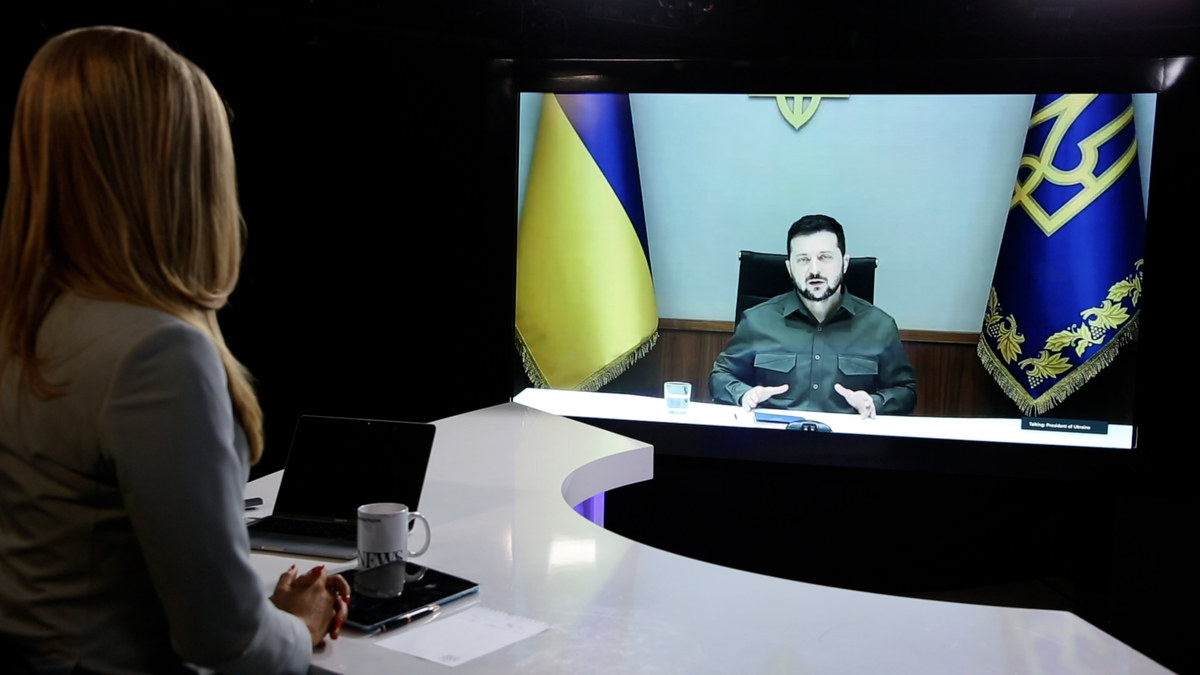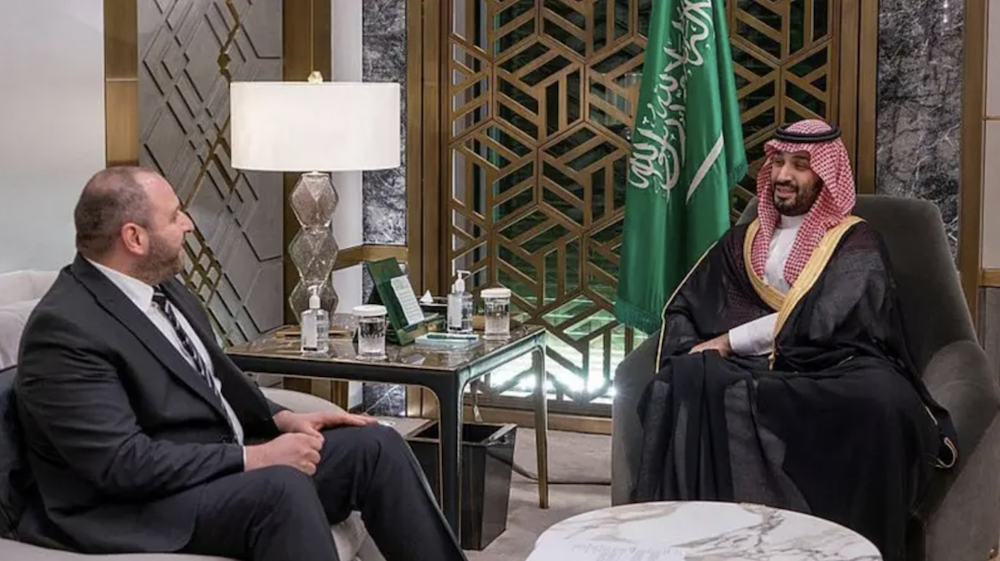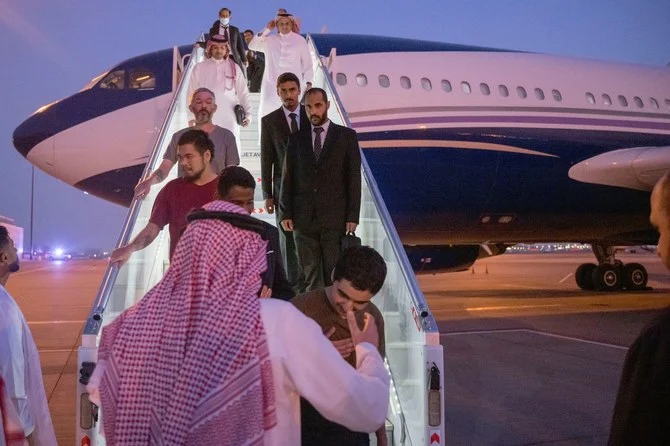RIYADH: Volodymyr Zelensky, the Ukrainian president, has called Russian President Vladimir Putin’s referendums and accords formally recognizing the annexation of territories in eastern Ukraine a “bloody PR-(stunt) based on human victims.”
“I’m not sure what kind of referendums they had. We don’t have any such referendums in Ukraine. We don’t have any law even for that purpose,” Zelensky told Frankly Speaking host Katie Jensen in an exclusive interview via Zoom video link from Kyiv.
Referendums across Luhansk, Donetsk, Zaporizhzhia and Kherson saw an overwhelming majority voting to join the Russian Federation, in a process that many international observers believe was rigged.
Zelensky also rebuffed Putin’s recent claims of major victories on the battlefield. Just last week, Ukrainian forces retook the strategic eastern town of Lyman located in one of the four regions annexed by Russia, prompting Moscow to announce the “withdrawal” of its troops to “more favorable lines.”
“What they declare is clearly different from what they can do. They said they will occupy our territory, our nation. But in eight months of the war, I can tell you that we won back yet another city, the city of Lyman in Donetsk Oblast, exactly the one that Russia declared as fully occupied a couple of days ago,” said Zelensky.
“I can assure Russia and the Russian people that, unlike Russia, we are not interested in Russian territories. We are interested in our territory, in our borders based on the international recognition from 1991.”

Zelensky speaking to Frankly Speaking host Katie Jensen in an exclusive interview via Zoom video link from Kyiv. (Screenshot/AN Photo)
The war in Ukraine has shaken the region and the global geopolitical and economic order due to shifts in the trade of energy, the rising cost of oil and gas, and the reconfiguration of supply chains.
More than six million Ukrainians fled to nearby countries. Meanwhile, diplomatic tensions have mounted as nations are pressed to choose a side. There is also growing concern for global food security.
News of Putin’s annexation of four Ukrainian regions has put world leaders on edge once more, as there appears to be no clear end to the war in sight.
For Zelensky, there are three components that will contribute to Ukraine’s eventual success.
“I think it’s a great victory for any nation worldwide when its people are united and people are able to leave some minor squabbles and historical discrepancies. This is very important,” he said.
“Another important step is that we are advancing against the world’s second biggest army, and we are able to show that the true strength is in unity, not in armaments.
“The third victory is, we have been able to unite Europe and the whole world. You know, before it was much more like everyone stands for him or herself. Now we see this unification and we see that there will be many more challenges also internationally, and there will be more of them.”
Despite Zelensky’s note of optimism, Moscow has vowed to never give up its newly annexed areas and to defend them with all means available. Ramzan Kadyrov, leader of the Chechen Republic, has even gone so far as to suggest the use of low-grade nuclear weapons in Ukraine.
Zelensky dismissed these threats, branding Kadyrov a “terrorist who was not even elected by his own people.”
“This is not serious. Come on. In (the) modern world, how can someone threaten others with nuclear weapons? Yeah, we have lots of terrorists worldwide. We have killers, but I cannot condescend to talk to a terrorist like that,” he said.
Since the annexations, Zelensky has signed a request asking for the acceleration of the process of Ukraine joining NATO. However, many skeptics view this as a futile request, especially given the response from Washington did not signal any immediate action.
On Saturday, US National Security Adviser Jake Sullivan said the US believes Ukraine’s NATO application “should be taken up at a different time.”
“Right now, our view is that the best way for us to support Ukraine is through practical, on-the-ground support in Ukraine and that the process in Brussels should be taken up at a different time,” said Sullivan.
In spite of this, Zelensky said countries should “pay attention just to the facts, not just to the words.”

Crown Prince Mohammed bin Salman during a meeting with Ukrainian President Volodymyr Zelenskyy’s Special Envoy Rustem Umerov in September. (SPA)
“We had statements from 10 allies, NATO members, with full support for Ukraine,” he said. The country should join NATO “as soon as possible.”
“I would rather say not when, in terms of time, but in terms of geography. I think it might happen when we will be standing at our borders.”
Meanwhile, the Ukrainian actor-turned-wartime leader also repeated his rejection of Putin’s offer to negotiate, firmly reiterating that he will only negotiate with a different president.
“We did warn them, if you want to launch these fake referendums, there will be no further talks with the president of the Russian Federation, for if the Russian president cannot respect the law, international law, the constitution, and by the way, not just our constitution, but that of his own country, he should not be violating our territorial integrity if this happens,” Zelensky said.
“Am I in a position to talk to him? He’s not a president.”
However, there does seem to be room for mediation and initiatives that could help to solve different pressing issues such as prisoner swaps and the release of Black Sea grain from Ukraine’s southern ports.
Just last month, Saudi Arabia brokered a prisoner swap between Russia and Ukraine, playing an important diplomatic role between the warring nations.

Saudi Arabia’s Crown Prince Mohammed bin Salman last month held successful mediation sessions to release ten prisoners from various countries from Russia. (SPA)
“I’d like to thank Saudi Arabia for the effort,” said Zelensky. “Given the ties that the crown prince has with Russia, probably it was, you know, a good chance of success, and I’m very much thankful to him for this brilliant result.”
The deal saw almost 300 people, including 10 foreigners, returned to their homelands, the first of very few breakthroughs since the war began.
The Saudi Foreign Ministry said at the time that the initiative was based on the support of Crown Prince Mohammed bin Salman, and in continuation of his efforts to adopt humanitarian initiatives toward the Russia-Ukraine crisis.
“We are open to any proposals when it is about the results to be achieved, the results of such efforts,” said Zelensky.
While Saudi Arabia has been trying to mediate, Iran has been accused of lying to top Ukrainian officials and selling drones to Russia.
Ukrainian forces shot down Iranian kamikaze drones sold to Russia in an effort to target civilians, which led Zelensky to dismiss Iranian diplomats from the country.
“It is sad that we have to recognize that the Iranian government is lying, as the Russian Federation government is, because we had contact with Iran’s leaders at the topmost level. We talked to the embassy, we had the ambassadors called up to the Ministry of External Affairs, and we were assured that nothing was sold to Russia, it wasn’t their drones, and nothing of the kind,” he said.

During his interview, Zelensky rebuffed Putin’s recent claims of major victories on the battlefield. (AN Photo/Screenshot)
“We have a number of these downed Iranian drones, and these have been sold to Russia to kill our people, and they are — you’re right — they are being used against civilian infrastructure and civilians, peaceful civilians. Because of that, we sent Iranian diplomats away from the country. We have nothing to talk with them about.”
While the war rages on, Zelensky has also been looking to the future and insists there are big opportunities for Arab nations to invest in the rebuilding of Ukraine.
“We would really love to see Arab businesses, and (for) Arab countries to be present, working in our country. We are ready to offer wonderful terms and conditions for businesses, fiscal, and so on. And there is also one ambitious aim for every country willing to come to Ukraine with an idea of recovery.”
“There will be a possibility for private companies, for Arab countries as well, because it is about rebuilding — recovering the whole of the state, of the nation.”
However, a recent Arab News/YouGov study conducted in May showed that a majority (66 percent) of Arabs felt indifferent toward the Russia-Ukraine conflict. Furthermore, a majority of respondents from the Arab world expressed a view that the blame for the war lies not with Russia but with US President Joe Biden and with NATO for not allowing Ukraine to join years ago — a finding Zelensky challenged.
“Truly, this war was started by Russia, and Russia is the only one to blame. What else could the united West do to avoid it? Maybe they could do more, but to blame the US, that they, the war is because of them, this is not just, this is not true. Only Russia is guilty of that,” he said.
Among countries in the GCC, Levant and North Africa, although NATO is perceived more often as the party responsible for the conflict, the apportioning of blame is more balanced. People in the Gulf states, for example, blame NATO (23 percent) only marginally more than they do Russia (19 percent).
Despite opting to condemn Russian aggression during a UN vote last March, major Arab countries, such as Saudi Arabia, Egypt and the UAE, have remained largely neutral, and expressed a desire to mediate between Moscow and Kyiv.
Arab News Disclaimer
* It is important to note that since the beginning of this war, Arab News has reached out numerous times to various Russian officials for comment. Most recently the newspaper also reached out to the Ministry of Foreign Affairs official spokesperson, Maria Zakharova, to appear on Frankly Speaking.
To date, all of our interview requests have fallen on deaf ears. However, Arab News wishes to reiterate that in our adherence to our professional duty, Ms. Zakharova’s invitation to appear on Frankly Speaking remains open, and the program looks forward to having her on this show whenever she accepts.



























